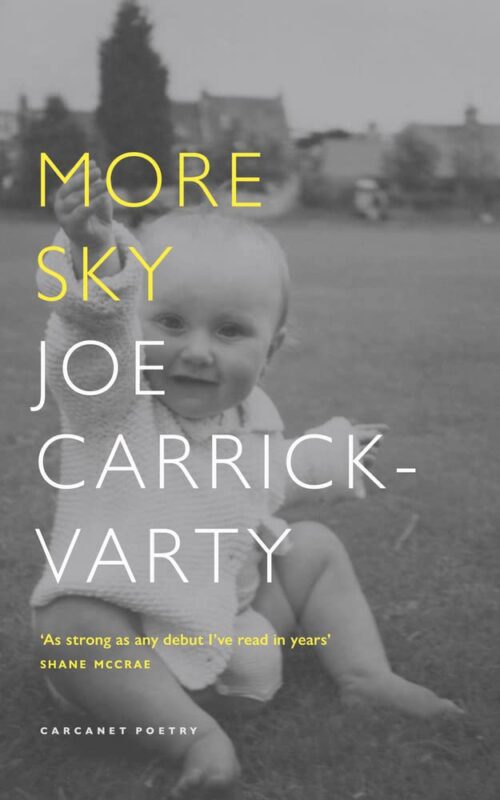REVIEW: JOE CARRICK-VARTY’S ‘MORE SKY’
By Stella Backhouse

If I had to condense Joe Carrick-Varty’s complex new collection More Sky into just a handful of lines, I’d choose a short section from ‘THE CHILDREN’. In the aftermath of his father’s decision to purchase a shotgun, Carrick-Varty realises that he acquired it from a “man from the pub/someone I’ll walk past for years/which means I am/existing in relation to this moment”. What is encapsulated here, I think, is the action of trauma on perception of time: defying time’s onward flow, trauma is eternally present, dictating the affected person’s behaviour and responses for years after the event that triggered it and demanding endless re-enactment of the feelings it unleashed.
And so, by continually revisiting the same outwardly banal housing-estate-Anywheresville landmarks (of time, of geography, of emotion), More Sky reinvents them as a powerful psychic map which the trauma survivor is unable to exit. Except in this case it’s two maps, one a continuation of the other. Raising questions about where the self begins, Carrick-Varty’s trauma seems to have its origins not in his own, but in his father’s childhood. The father’s mental incarceration in a moment of catastrophe manifests in adulthood as alcohol and gambling addictions and as violence, visited on himself and others, which in turn created trauma in Carrick-Varty’s life.
Detailed and vague at the same time, Carrick-Varty takes us eyeball-to-eyeball with trauma while simultaneously backing away from it. To the outsider, the precise significance of many of the reference points (skyscrapers, picnics, coral reefs, whales, zips – I could go on) is unclear; but translating images into exact meanings is not, I think, the point. The point is to portray narrative as camera-shake: zoomed-in but out-of-focus. The claustrophobically menacing ‘54 Questions for the Man Who Sold a Shotgun to My Father’ exemplifies this, alternating private circling with brief, darting, head-on confrontation: “Does it rain in your weather/Is there a bus?/Are you waiting by the frozen fruit in Aldi/Wearing a beanie/…Is that a lasagne in your oven?”
More Sky is a long collection divided into two parts, each roughly equal in length. The first part is made up of discrete poems in a number of forms. The second is a single poem, ‘sky doc’, divided into sixty-four eight-line poems, all the same maybe shape of a head in profile, all beginning with the words “Once upon a time when suicide was…”. Most of these poems, recycling motifs introduced earlier, are impressionistic recollections of events from Carrick-Varty’s childhood, but superimposed with the adult’s understanding of inherited trauma that was not available to the child.
In some ways, ‘sky doc’ reminded me of the involuntary re-experiencing of my late husband’s death that I went through every day for months after he passed. Every page seems like a fresh start, as every morning did to me then, a promise to the self that childhood will work out like a fairy tale this time. And then, inevitably, every poem implodes right back to the same place: “as a kid I would open the skin/at the top of my thigh/every time/my dad hit my mum”.
But it’s more than that. Flipping backwards and forwards in time, ‘sky doc’ describes firstly, how a child who knows no different accepts violence and dysfunctionality as normal (“like many kids the first person/to punch me in the face was my dad”) and secondly, the growing insight that it is not normal (“I realised my family/was probably very wrong when/I started going for sleepovers I think/I dropped a bowl and nothing stormed/from the edge of the reef”). In its constant repetition, it also enacts the difficulty of escape. This is not just a washing machine stuck on spin cycle; because trauma intersects at least three time spheres – the past, the present, the eternal present – it’s also an exploration of the relationship between identity and time.
Although it has particular reference to trauma, More Sky is – more broadly – about the construction of internal landscape. But alongside trauma, the other long-term survivor here is the father-son bond. Despite everything – despite all the worry, all the embarrassment, all the unresolved issues – Carrick-Varty still loves his father, his love shines through and in it, perhaps, we glimpse the possibility of something outside time.
More Sky is available to purchase online direct from publisher Carcanet Press, as well as other bookshops and retailers.
–
